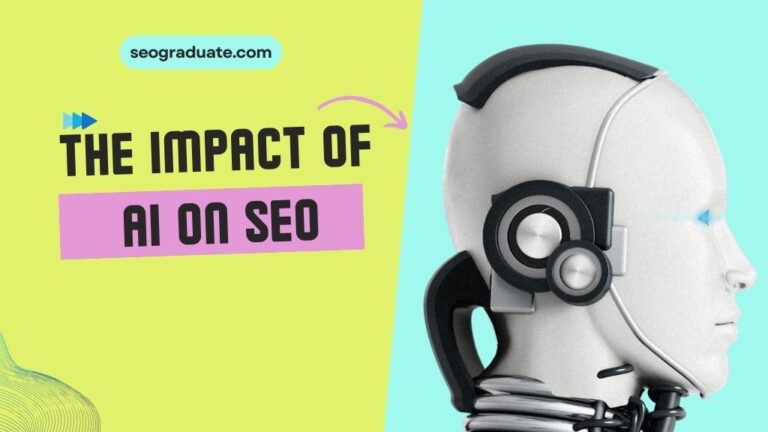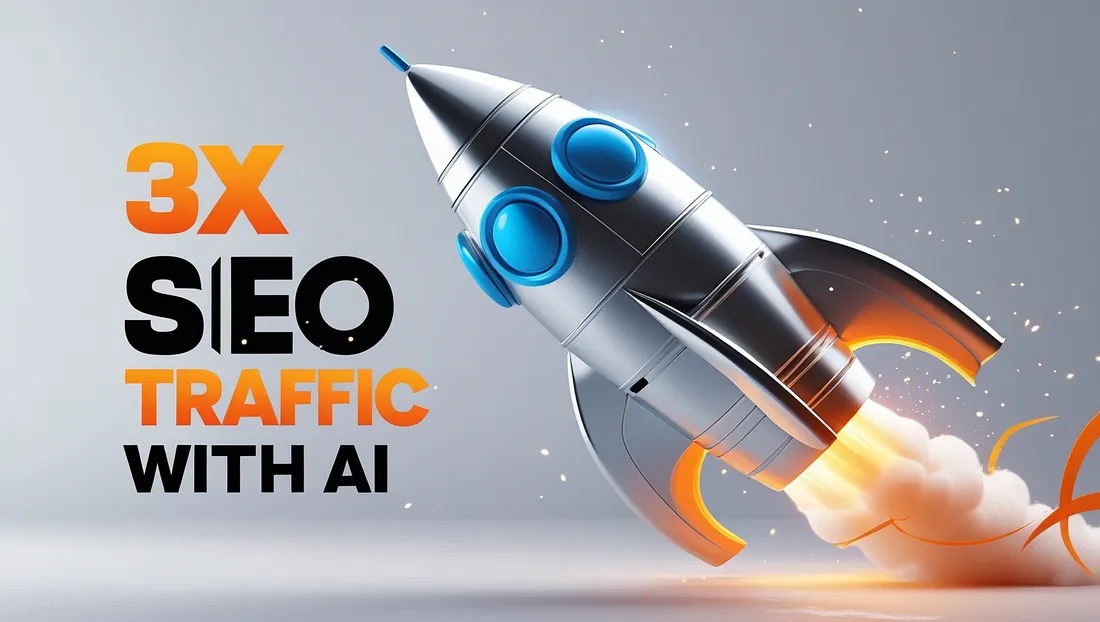AI on SEO: Search Engine Optimization (SEO) has come a long way since the early days of the internet. From keyword stuffing to sophisticated content strategies, the evolution of SEO reflects the dynamic nature of digital marketing. Now, with Artificial Intelligence (AI) entering the arena, the game is changing yet again. But how exactly is AI reshaping SEO? And what do you need to know to stay ahead in this AI-driven landscape?
Table of Contents
ToggleWhat is AI on SEO?
AI on SEO refers to the use of artificial intelligence technologies to enhance and automate various aspects of search engine optimization. AI helps marketers analyze data, predict trends, and implement strategies more efficiently. Historically, SEO was a manual, labor-intensive process. With AI, much of this work can be automated, allowing for more precise and effective optimization efforts.
AI-Powered Tools in SEO
AI-powered tools have revolutionized the way we approach SEO. Here are some of the key tools that are making waves:
Keyword Research Tools
AI-driven keyword research tools, like Google’s RankBrain, analyze user queries and identify the most relevant keywords. These tools can predict which keywords will perform best, taking the guesswork out of keyword planning.
Content Optimization Tools
Tools like Clearscope and MarketMuse use AI to analyze top-performing content and suggest improvements for your own content. They look at factors like readability, keyword usage, and content structure to help you create SEO-friendly articles.
Analytical Tools
AI-powered analytical tools, such as Google Analytics and SEMrush, provide deep insights into website performance. They offer predictive analytics, real-time data, and actionable recommendations to optimize your SEO strategy.
Enhanced Keyword Research
One of the most significant impacts of AI on SEO is in keyword research.
AI’s Role in Discovering New Keywords
AI can analyze massive amounts of data to uncover new keyword opportunities that humans might overlook. It can identify trends and patterns, providing a more comprehensive keyword list.
Predictive Keyword Analysis
Predictive analysis tools can forecast which keywords will be popular in the future, allowing you to stay ahead of the curve. This capability is crucial for maintaining a competitive edge in SEO.
Content Creation and Optimization
AI isn’t just about finding the right keywords; it’s also about creating and optimizing content.
AI-Generated Content
AI can generate content based on specific inputs and parameters. While it may not replace human creativity, it can assist in producing large volumes of content quickly, ensuring consistency and relevance.
AI in Content Personalization
Personalization is key to engaging users, and AI excels at this. By analyzing user behavior, AI can help tailor content to individual preferences, increasing engagement and conversion rates.
Voice Search Optimization
With the rise of voice-activated assistants like Siri and Alexa, voice search is becoming increasingly important.
Rise of Voice Search
More people are using voice search to find information online. This shift requires a different approach to SEO, focusing on natural language and long-tail keywords.
AI’s Impact on Voice Search SEO
AI helps optimize for voice search by understanding the nuances of spoken language and predicting user intent more accurately. This ensures that your content is more likely to appear in voice search results.
Improved User Experience
AI plays a crucial role in enhancing user experience (UX) on websites.
Personalization of Web Content
By analyzing user data, AI can deliver personalized content experiences. This not only improves user satisfaction but also boosts SEO by increasing dwell time and reducing bounce rates.
AI-Driven UX Improvements
AI can help identify UX issues and suggest improvements, making websites more user-friendly. This includes everything from navigation to load times, all of which impact AI on SEO.
Automation of SEO Tasks
Automation is one of the most significant benefits of AI on SEO.
Automated Reporting
AI can automate the generation of SEO reports, providing insights faster and more accurately. This saves time and allows for quicker decision-making.
Routine Task Automation
Routine tasks like keyword tracking, backlink analysis, and rank monitoring can be automated, freeing up time for more strategic activities.
AI and Mobile SEO
With the increasing use of mobile devices, mobile SEO has become critical.
Mobile-First Indexing
Google’s move to mobile-first indexing means that the mobile version of your site is now more important than ever. AI helps ensure your site is optimized for mobile users.
AI’s Role in Mobile Optimization
AI can analyze mobile performance and suggest improvements, from page speed enhancements to better mobile usability.
AI in Link Building
Link building remains a cornerstone of SEO, and AI can significantly enhance this process.
Smart Link Building Strategies
AI tools can identify the best sites for link building, helping you develop a more effective link-building strategy.
AI-Driven Backlink Analysis
AI can analyze your backlink profile and that of your competitors, identifying opportunities and threats. This ensures your link-building efforts are both effective and compliant with search engine guidelines.
SEO Performance Analysis
AI enhances the way we analyze SEO performance.
Predictive Analytics
Predictive analytics tools forecast SEO trends and performance, helping you make data-driven decisions. This proactive approach can give you a competitive edge.
Real-Time Data Insights
AI provides real-time insights, allowing for immediate adjustments to your SEO strategy. This agility is crucial in a constantly changing digital landscape.
Challenges and Limitations of AI on SEO
Despite its benefits, AI on SEO also comes with challenges.
Potential Risks
Reliance on AI can lead to over-optimization and penalization by search engines. It’s essential to balance AI-driven strategies with human oversight.
Ethical Considerations
The use of AI raises ethical questions, such as data privacy and the potential for manipulation. Ethical SEO practices must be upheld to maintain trust and integrity.
Future Trends in AI on SEO
AI continues to evolve, and so will its impact AI on SEO.
AI Advancements
Advancements in AI technology will lead to even more sophisticated SEO tools and strategies. Staying updated with these changes will be crucial.
Future SEO Strategies
Future SEO strategies will likely be more data-driven and automated. Embracing AI now will prepare you for these upcoming changes.
Case Studies of AI Impact on SEO
Real-world examples illustrate the power of AI in SEO.
Examples of Businesses Leveraging AI
Many businesses are already seeing success by integrating AI into their SEO strategies. From e-commerce giants to small businesses, AI is proving its worth.
Success Stories
Success stories showcase how AI can boost SEO performance, increase traffic, and drive conversions. These case studies provide valuable insights and inspiration.
Conclusion
In summary, AI is transforming SEO in profound ways. From keyword research to content creation, and from user experience to performance analysis, AI offers numerous benefits. However, it’s essential to approach AI with a balanced perspective, combining its capabilities with human creativity and ethical practices. By doing so, you can harness the full potential of AI in your SEO strategy, staying ahead in the ever-evolving digital landscape. Embrace AI now to future-proof your SEO efforts and stay competitive in this fast-paced digital world.
FAQs
1. How does AI improve keyword research?
AI improves keyword research by analyzing large datasets to identify relevant keywords and predict future trends. This leads to more accurate and comprehensive keyword strategies.
2. Can AI generate content?
Yes, AI can generate content based on specific inputs and parameters. While it may not replace human creativity, it can assist in producing large volumes of consistent and relevant content.
3. How does AI affect voice search optimization?
AI helps optimize for voice search by understanding natural language and predicting user intent more accurately. This increases the chances of your content appearing in voice search results.
4. What are the ethical considerations of using AI in SEO?
Ethical considerations include data privacy and the potential for manipulation. It’s essential to use AI responsibly and uphold ethical SEO practices to maintain trust and integrity.
5. What are the future trends in AI and SEO?
Future trends include more advanced AI technologies leading to sophisticated SEO tools and strategies. Embracing AI now will prepare you for these future developments.





